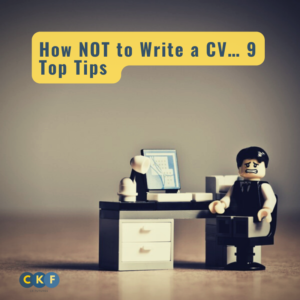 As a CV writer, I see a lot of CVs. When I say a lot, I mean… well, thousands of them.
As a CV writer, I see a lot of CVs. When I say a lot, I mean… well, thousands of them.
Some are fine. They just need a professional makeover. Other CVs, however, are headed straight for the slush pile. These candidates may be perfect for the job — but their CVs are putting off employers faster than you can say `Don’t hire me’.
What are they doing wrong? In this post, you’ll find 9 top tips on how NOT to write your CV.
Be overly modest
For many of us, blowing our own trumpet doesn’t come naturally. We tend to hide our light under a bushel. (Actually, I’m not sure what a bushel is but evidently, there are lots of lights underneath it).
The fact is, employers are looking for evidence that you’ve done a good job — and that involves a bit of trumpet-blowing.
So here’s how to boast, without sounding like a plonker:
Rather than writing about your responsibilities and day-to-day tasks, focus on what you achieved.
Here, I’ll give you an example:
| Bad CV | Good CV |
| Increased sales | Exceeded sales target by 25%, increasing business profits by £75K in 2022 |
Copy and paste from the job description
Copying the job description is a complete no-no. So is asking ChatGPT to craft your career description, it may get past the computerised Applicant Tracking System (ATS), but here’s the problem:
When a real-life human lays eyes on your CV, the game is up.
It will end up lying in the comfort of the recycling bin. From an employer’s viewpoint, the only skill you’ve demonstrated is copying and pasting.
It’s fine to pick out keywords from the job description, but do this at the editing stage after you’ve written about your relevant experience and achievements.
Go on and on… and on (and on)
CVs should be a maximum of 3 pages, with lots of white space. That doesn’t leave room for your entire life history.
As a general rule, it’s best to aim for quality, not quantity. You don’t have to tell everything.
Include only the relevant parts of your career — the experience which directly relates to the job description — and try not to go back into the mists of time. It won’t impress a busy employer sifting through hundreds of CVs.
Even if you’ve been working for decades, most employers are only interested in the last 10 or 15 years. Prior to that, if it’s relevant, you can always highlight previous experience by saying: `My earlier career included…’
Use business cliches and overly formal language
If I had a pound for each time I saw the word `spearheaded’, I’d be living in the Seychelles. And as for `leveraged’ and `utilised’… Don’t get me started.
Using overly formal language or business jargon is like taking a scalpel to your personality. It surgically removes all traces of the real, likeable human behind the CV.
Here’s something I see all the time:
`Steve works well in a team and also on his own initiative.’
Does that tell you anything remotely useful about Steve?
To grant an interview, employers want to know who you are as a person. Now, don’t get me wrong. I’m not recommending you include thoughts on poetry, jokes, opinions about Brexit, or details of a messy divorce… but it’s perfectly OK to inject your own personality into it.
A good tip is to read your CV out loud. If the language sounds natural, like something you’d say during an interview, employers are likely to keep reading.
Forget all about spelling and grammar
Your CV is generally the first point of contact with a potential employer. They don’t yet know you, so this is your first impression.
Making grammar and spelling mistakes is the equivalent of walking into an interview room and blowing a raspberry. It gives busy employers a reason to toss your CV into the dreaded slush pile.
Now, I know what you’re thinking:
That isn’t fair. A lack of grammatical skills doesn’t affect my ability to do the job. Perhaps not, but here’s the thing:
Spelling or grammar errors on a CV translate into a lack of attention to detail. To a potential employer, that means mistakes, and they’re unlikely to hire someone who requires damage control.
When you’re asking someone to trust you with sensitive information, expensive equipment or large financial deals, it’s best to get the details right.
Mistakes are easy to make and difficult to spot. If you’re worried, ask someone to proofread your CV before uploading it.
Write as though you’re famous
Do you remember Steve from further up the page? He’s the guy who `works well in a team and also under his own initiative’ *yawns loudly*.
Why is Steve writing about himself in the third person? Is he famous or something?
This CV is all about you, so don’t be afraid to use the word `I’.
Include random skills…
I see a lot of CVs with meaningless skills.
Despite having no relevance to the job, vague skills like `operational management’ or `financial leadership’ are sprinkled randomly into the skills box.
It’s not a great idea to chuck in skills willy nilly. Employers like to see evidence as to where and how they’ve been used. And, as I mentioned before, they want to see what’s been achieved as a result.
…and irrelevant (or bizarre) training
Irrelevant training is also pretty common, often included in an otherwise sensible list of courses. Here’s an example:
- Assertiveness training
- Leadership development
- Developing a growth mindset
- Harnessing my unicorn powers
I once saw vampirology training on a CV. Seriously, it’s a thing, apparently.
Use a Heavily Designed CV template
This may be controversial. After all, beautiful CV templates are everywhere these days. There is, however, a good reason why I’m advising against them.
Do you remember earlier when I mentioned ATS? Automatic Tracking Systems are used by 97% of UK companies to screen and grade CVs.
Here’s the problem:
Once a beautifully designed CV template with boxes, graphics and columns has been through an ATS, it looks like a dog’s dinner.
ATS can’t read them. It parses everything as a single line, mashes the words together and turns your gorgeously designed CV into an unreadable mess.
Keep it simple. Most employers ask for CVs in Word or PDF format. Just keep your content from left to right.
Use your Tinder profile picture
The UK is unique in not asking job candidates to include a photo with their CV. That said, some people are including them these days, and on LinkedIN, it’s the norm.
Please don’t use your online dating profile picture.
You’d be amazed at the number of CV photographs I’ve seen with trout pouts, come-hither side angles and (I wish I was joking) cleavage squeezes.
Including a good, professional photo can sometimes help engage the reader, but it’s absolutely NOT fine to use your Tinder profile photo.
That’s it for now. If you’d like some help writing your CV (and choosing your photo), you can reach me here.

Charlotte Eve
Charlotte Eve is an award winning CV Writer, LinkedIn Writer and Interview Coach, helping people internationally to move confidently into new roles. With an HR background, passion for writing and determination to pursue a ‘useful’ career, Charlotte set up C K Futures to support people most at risk in the job market. She is recognised by recruitment agencies, career coaches and back-to-work organisations nationwide as a specialist in helping people affected by redundancy, those seeking career change, individuals with complicated careers, parent returners and those with career gaps. Charlotte has helped more than 20,000 people into new roles, delivers her Masterclass Course to employment organisations and is sought out by businesses for her outplacement services. Also mum to two teenagers, Charlotte supports charities to help young adults and is a Youth Mentor.
